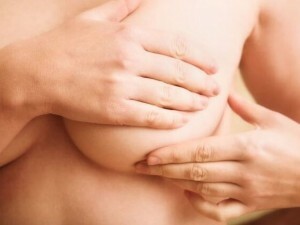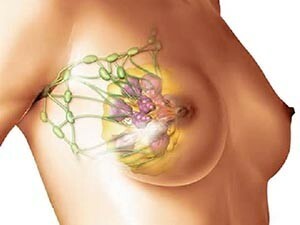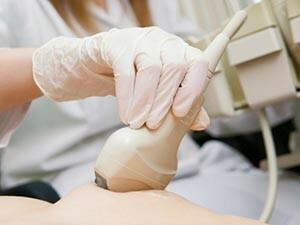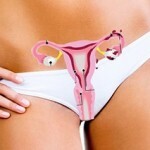Menopause is a transitional period for the female body. There are a lot of feelings not experienced before. A woman can not always correctly assess their nature, is it normal, for example, that mumps are painful for menopause? After all, everyone is used to the fact that these feelings are a signal of danger.
Is there a natural explanation for breast tenderness?
 Breasts are very susceptible to hormones. Thanks to them, the development of organs in adolescents begins. These substances lead to regular changes in the reproductive age.
Breasts are very susceptible to hormones. Thanks to them, the development of organs in adolescents begins. These substances lead to regular changes in the reproductive age.
Breast milk is produced in young mothers, too, thanks to hormones. But if it comes to the extinction of the reproductive function, someone will doubt whether the chest can hurt with menopause.
Menopause occurs against a background of a hormonal storm, when the amount of substances first fluctuates, then decreases sharply. Naturally, the changes respond to the mammary glands.
It can manifest in every woman approaching the boundary in different ways: some easily tolerate soreness, others experience strong sensations in this area. But completely insensitive to the breast, the hormonal changes that occur can not be.
When the climax pains, whines, tingle the mammary glands, as if before critical days, this is certainly caused by a decrease in the volume of hormones.
What else can make the breasts hurt?
There are other causes of soreness in the chest. It should be immediately said that the nature of the sensations is different, not only the intensity. The pains are disturbed by cutting, with a feeling of bursting, sharp, pulling.
To a large extent, this also depends on the personal characteristics of the woman's body. And not always the jumps of estrogen and progesterone are directly guilty of them. The question why the chest hurts with menopause may have other answers:
-

Mastopathy is one of the causes of chest pain in a woman during menopause
Changing the composition of fatty acids. In the mammary glands, fatty tissue takes up a fairly large part, so the organs respond to age-related imbalances in this area. Pain for this reason is aching, weak;
- Diseases not affecting the mammary glands. Osteochondrosis and cardiovascular diseases, which in the menopause period begin to develop rapidly for objective reasons, also respond with pain in the chest;
- Stress. Changing the balance of hormones leads to the fact that in the emotions of a woman anxiety, tearfulness or irritability prevail. All of them violate the chemical reactions taking place in the tissues, which is why the chest hurts with menopause;
- Previously injured and operations of the chest or mammary glands. Even if it was a long time ago, the healed tissues react more acutely to the fluctuations and fall of hormones than those not affected by damage;
- Medications. Most women to the menopause take them constantly. But this is also an intervention in the chemical reactions taking place in the body. And it can respond with pain in the mammary glands;
- Smoking and alcohol. Harmful habits increase the volume of fat tissue and disrupt the blood supply of all organs, depriving the access of oxygen and interfering with normal metabolism. Hence the pain, including in the lobules of the chest;
- Pregnancy. No matter how paradoxical it may sound, but if the nipples hurt with menopause, it's worth making a test. At its early stage, when the monthly ones still come, this is very possible. However, pains in the nipples at the same time are also due to a natural decrease in the volume of progestins;
- Mastopathy. With the withdrawal of reproductive opportunities this disease, if it is found earlier, does not disappear anywhere. The signs are the same as at a younger age, that is, soreness, discharge, redness. This is not due to a decrease in the concentration of estrogens, but just against the background of their high volume;
- Breast cancer. With him, the pain is found at a rather late stage, when other symptoms were seen earlier.
How does the volume of mammary glands change?
Frequently asked question for doctors: can breast enlargement occur with menopause? The majority are sure that this is a dangerous sign, as in normal growth of the mammary glands occurs to 20-25 years, and by this time the organs are finally formed.
Those who think this way are not entirely right. Breast enlargement occurs with menopause due to the growth of adipose tissue. Moreover, a woman's weight and volume not only increase her breasts.
This symptom is not present at all, it is considered normal until the last menstruation arrives. At the next stage of menopause, breast augmentation does not occur.

These processes are natural for this period, but require increased attention. Since with mastopathy, the same manifestation is possible because of the ability of lipid cells to produce estrogens.
Nipple swelling during menopause can also have a twofold explanation. The symptom also occurs due to natural causes, due to the disappearance of the hormonal effect on the chest. But the most dangerous culprit of this is Paget's disease, that is, a malignant tumor that has grown on this site.
What to do with pain, how to help yourself?
Sensations associated with this part of the body are sometimes so strong that the question of how to relieve chest pain during menopause comes to the fore. Since there are several reasons for causing it, at the beginning it is necessary to be examined in order to find out which of them provokes. For this, there are ultrasound of the mammary glands and mammography. The last survey should generally be regular, done once a year.

Carrying out ultrasound for chest pain during menopause
Do not use synthetic estrogens and phytopreparations yourself. They help in eliminating other symptoms of menopause, but with pain in the chest are useless, and some even harmful. When mastopathy, estrogens will intensify it, provoking the degeneration of cells. It is better to take vitamins B, C, E, A, D, and for relief of the syndrome, pain relievers:
- Ibuprofen;
- Diclofenac;
- Paracetamol.
To reduce the negative stress on the chest take a sedative:
- Motherwort Forte;
- Tamoxifen;
- Extract of valerian.

But to reduce morbidity in the chest and minimize possible health-related threats, a complex of efforts is needed:
- Wearing a bra that supports the chest, but does not tighten;
- Mammary gland massage;
- Reduction of fatty foods in the diet. It can lead to the growth of tissues in the chest;
- Physical activity without sudden movements that will exacerbate soreness. This is yoga, dancing, swimming, just gymnastics in the gym.
If the menopause becomes more sensitive, the mammary glands hurt, do not go to extremes. Often, some women suffer feelings to the "victorious end" when they become intolerable. And others themselves put themselves a terrible diagnosis, and also out of fear do not go to the doctor.
Tactics for chest pains should be different: finding out the reasons and taking measures to reduce them, prevent and treat diseases that are better to catch at an early stage.

 We recommend reading the article about changes in ovarian function in menopause. You will learn about the features of the functioning of this organ and its normal size, as well as ways to prevent diseases of the reproductive system.
We recommend reading the article about changes in ovarian function in menopause. You will learn about the features of the functioning of this organ and its normal size, as well as ways to prevent diseases of the reproductive system.